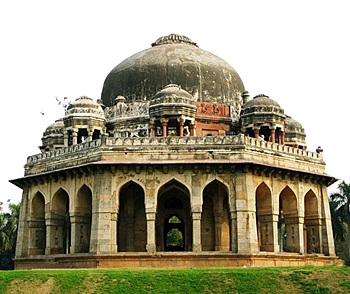 Khizr Khan was the founder ruler of Sayyid dynasty. He is said to be a descendant of Prophet Muhammad. But there is no proof for that. Probably, his ancestors originally hailed from Arab and he utilised this fact in order to strengthen his position throne. Khizr Khan was appointed as the governor of Multan by Firoz Shah Tughlaq. He participated in the war of succession between the rival princes after the death of Firoz. When Timur attacked India he got the opportunity and offered his services to Timur. Timur was pleased with his services and, before he left India, he appointed Khizr Khan as the governor of Multan, Lahore and Dipalpur. Khizr Khan never assumed the title of the Sultan.
Khizr Khan was the founder ruler of Sayyid dynasty. He is said to be a descendant of Prophet Muhammad. But there is no proof for that. Probably, his ancestors originally hailed from Arab and he utilised this fact in order to strengthen his position throne. Khizr Khan was appointed as the governor of Multan by Firoz Shah Tughlaq. He participated in the war of succession between the rival princes after the death of Firoz. When Timur attacked India he got the opportunity and offered his services to Timur. Timur was pleased with his services and, before he left India, he appointed Khizr Khan as the governor of Multan, Lahore and Dipalpur. Khizr Khan never assumed the title of the Sultan.
After the accession of Khizr Khan to the throne the empire of the Delhi Sultanate was limited to parts of Doab and Mewat. Khizr Khan doubled its territory as Punjab, Multan and Sindh were included into it. He wanted to extend the empire. His limited efforts to recover Katehar, Kannauj and Kampil failed. Khizr Khan pursued the policy of conciliation towards the Turkish nobles and allowed them to enjoy ownership of their jagirs. Yet they were disloyal to him and used their positions to rise in revolt against occasionally. Khizr Khan mostly engaged himself in keeping intact the territory of the Sultanate, which he had acquired in the beginning of his reign. During his last days, he attacked Mewat and destroyed the fort. He then plundered part of the territory of the state of Gwalior and proceeded up to Etawah whose ruler acknowledged his suzerainty.
Khizr Khan was wise, just and generous. His personal virtues, therefore, won the affection of his subjects. But as a ruler he could not achieve his ambition. He failed to solve those problems of the country which had affected it after dismemberment of the Tughlaq dynasty and had left the country in a state of virtual anarchy after the invasion of Timur. The Sultanate of Delhi could not gain ascendancy over other Kingdoms in India during his time and, therefore, remained one of the states among certain other significant states of the north.



















